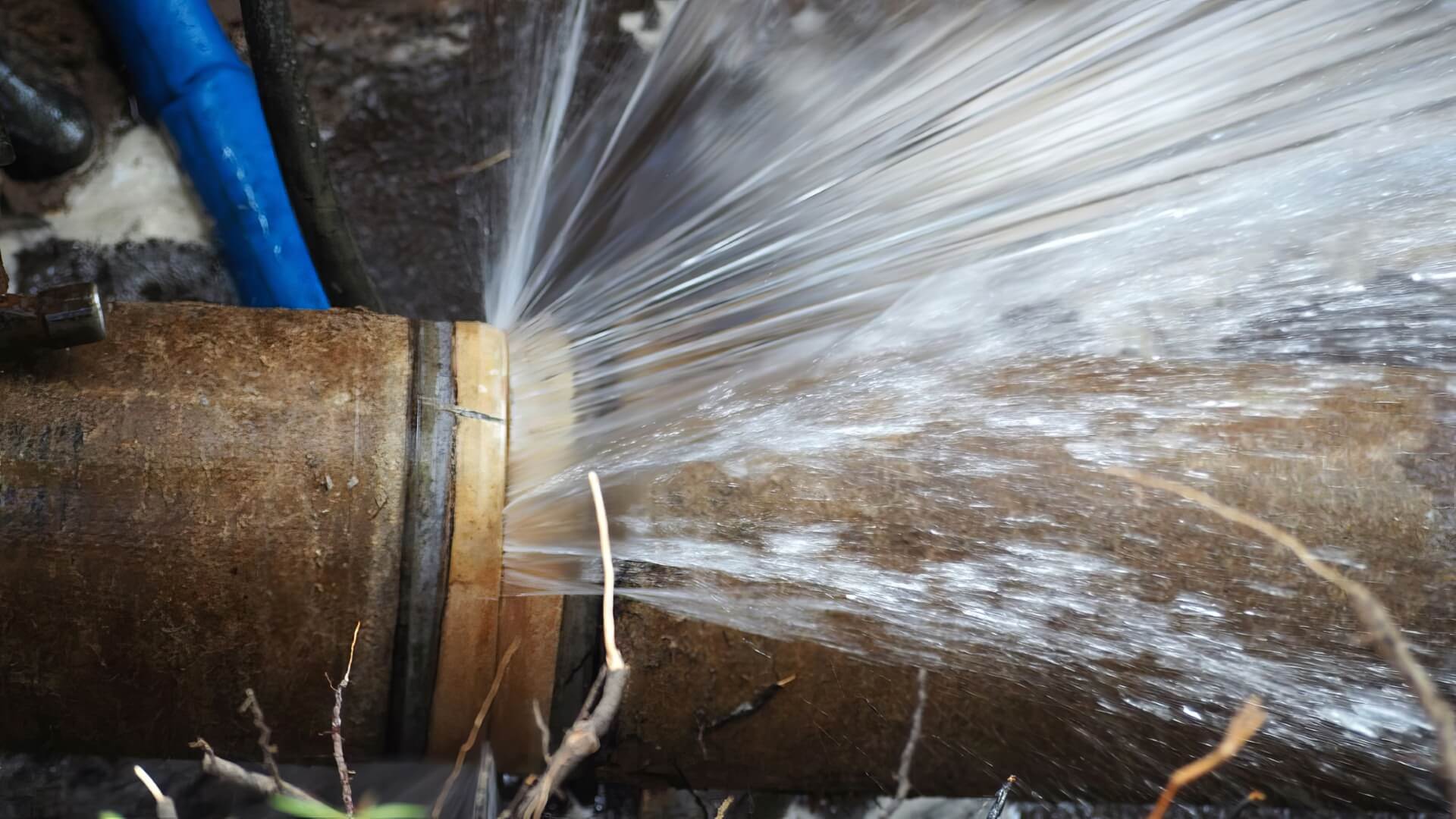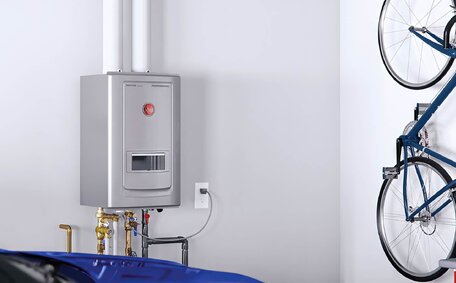Recognizing Signs of a Potential Gas Leak
There are a few key signs to watch out for when checking for potential gas leaks in your home:
- The scent of rotten eggs is a distinct sign of gas in the vicinity, typically linked to your gas system. An additive mimicking this scent is added to natural gas so that a potential gas leak can be detected if your olfactory senses pick it up. Detecting a scent like rotten eggs near your gas appliances necessitates swift action to investigate for possible natural gas leaks.
- A hissing sound emanating from a gas line, appliance, or meter is a clear indicator gas might be leaking.
- The appearance of bubbles during a soapy water test on connections indicates potential gas leaks.
- Dead vegetation or soot buildup on plants near gas appliances or vents.
- If appliance flames burn yellow or orange rather than blue, it suggests a gas escape and warrants urgent investigation.
At the initial hint there’s a gas leak, vacate the vicinity promptly and alert the emergency services. It’s a good idea to avoid operating electrical devices or flickering lights, as even a tiny spark can cause a dangerous interaction with the gas.
Conducting a Bubble Test
This section provides a step-by-step strategy for using the bubble method—an effective and straightforward tactic to unveil potential gas leaks. Follow these steps to effectively use the bubble test for detecting gas leaks:
- Prepare a soapy water solution in a spray bottle for application to gas pipes and connections. Infuse a few tablespoons of dish soap into the vessel and top it off with water.
- Thoroughly inspect areas prone to leaks such as joints, connectors, and seals, particularly if you think your gas stove is leaking. Focus on gas pipe junctures, taps, connectors, and sealing elements, particularly if you are concerned your gas stove is leaking gas.
- Thoroughly coat these areas, ensuring a meticulous inspection to detect any gas leaks in your home.
- Monitor the gas meter and surrounding areas for bubble formation, indicative of a potential gas leak, and consequently investigate for signs of escaping gas. Check metre connections, appliance vents, etc. An upsurge in bubble emergence often serves as a reliable indication of a prevalent issue when you suspect gas leaking, signalling an increased hazard.
- Upon observing bubbles that suggest a leak, especially close to a gas source, repair the leak by turning off the gas supply and vacating the area without delay. Call emergency services and do not reenter until given the all clear.
- During this process, use only non-electrical means to avoid igniting the gas. Do not operate electrical devices or lights.
Regular inspections using the soapy water method help verify system integrity, guarding against the escape of natural gas and proactively ensuring safety. Contact a professional to identify gas leak issues your gas systems might exhibit and investigate leak prospects should you harbour any concerns.
Using Gas Leak Detection Tools
Specialised gas detector devices are invaluable for pinpointing exact leak locations in devices or pipelines. There are several ways to detect leaks, including a few main types of detectors you can use:
Gas Detectors
Portable gas detectors employ high-sensitivity sensors to detect traces of propane, natural gas, or other flammable gases. An alarm will sound upon detecting high gas concentrations, signalling a potential leak, especially useful when suspecting a gas leak nearby.
Methane Detectors
Owing to methane’s properties, those who know how to read the signs conclude there’s gas indicative of leakage can be swiftly pinpointed thanks to detectors calibrated to respond to the presence of natural gases, proving extremely effective. These devices may also sound an audible alarm upon detecting higher levels of methane or natural gases, signalling a potential leak.
Carbon Monoxide Detectors
Carbon monoxide (CO) alarms, triggered by by-products of incomplete combustion, can also be crucial in detecting gas leaks, particularly as radon gas can be hazardous. Install CO detectors on all levels of your home for safety.
Using gas detection equipment involves scrutinising gas conduits for potential leaks, looking for signs of compromised integrity in ducts, tubing, and connectors. Detecting a gas leak in your home requires immediate evacuation and professional assistance to prevent the situation from worsening.
Taking Corrective Action
When a leak is detected, immediately turn off the gas and take these essential steps to ensure safety:
- Evacuate all occupants and pets from the premises, then decisively turn off all gas supply to ensure no lingering gas can endanger safety.
- From a safe location, dial 000 to report the leak and call for emergency help, especially if an extensive gas leak occurs. Alert neighbours to stay clear of the area.
- If accessible, close the main valve to cut off your property’s gas supply or shut off appliances individually.
- Avoid reentering the premises until there no doubt remains about the safety conditions, confirmed by emergency crews.
- Avoid attempting to locate or fix the leak yourself unless you are a licensed gas professional.
- For gas appliance or line repairs, call a licensed gas professional to prevent improper fixes.
- Consider installing a detector like gas leak detectors for added protection and early detection of leaks.
Engaging in immediate, careful steps at the initial warning of a leak can fix gas leak hazards, preventing related fires, blasts, and risks of carbon monoxide poisoning which can result in other perils. Addressing and resolving gas leaks quickly is crucial for safety and to prevent injuries.
Maintaining Gas Systems
Routine scrutiny and proper maintenance are key to learning how to detect gas leaks before securely operating your gas system and forestalling any leaks, effectively preventing gas issues before they escalate. We’re going to share vital maintenance tips:
Annual Inspections
Annual inspections by a licensed expert are vital to identify and resolve potential gas leaks and assess for corrosion, cracks, blockages, or carbon monoxide leaks.
Replace Rubber Parts
Rubber washers, hoses, gaskets, and seals can crack due to ageing, particularly near new gas lines. Ensure these components are replaced on a schedule or when cracking is observed.
- Replace washers that can deteriorate and lead to gas leaks - Every 5 years
- Hoses - Every 3 years
- Gaskets - Every 2 years
Clean Appliances
Regularly clean dust, grease, and debris from areas surrounding burners and ovens to maintain unobstructed gas flow. This practice prevents obstructions that could cause inefficient combustion and result in gas leaks.
Outdoor Appliances
Conduct a thorough examination of your gas bottle, especially checking the BBQ gas connections, conduits, valves, igniters, and ventilation pathways before their seasonal use. Check your BBQ for blockages like spider webs or nests.
Routine inspections, part replacements and cleaning will ensure the safety and performance of all gas-related fixtures to prevent leaks. If uncertain, seek professional plumbing services specialised in gas safety and related issues.
Hiring Professionals
Detecting and fixing gas leaks, which pose significant risks, require specialised knowledge, equipment, and licensing. Attempting DIY repairs without proper qualifications puts yourself, your family, and your property at risk.
Engage a skilled gas fitter, such as Quakers Hill Plumbing, for areas with suspected leaks or needing repairs.
- Using a high-quality gas leak detector to precisely identify any gas leaks on your property
- Pinpointing leak locations
- Ensuring the secure shut-off of gas systems
- Evacuating premises
- Fixing gas appliances, conduits, and attachments that are defective
- Offering round-the-clock emergency gas leak repair amenities
Entrust gas appliance leak response and repairs solely to licenced technicians who can help with expertise. Our experts can swiftly diagnose problems, halt any worsening conditions, and administer solutions to ensure safety, ready to come out and assist day or night. Remember to reach out to Quakers Hill Plumbing at 1300 349 338 or [email protected] for assistance.
Knowing When to Call for Help
It is crucial to seek professional help immediately if you detect any of the following signs of a potential gas leak:
- A strong rotten egg smell is a common indicator of a natural gas leak, often originating from appliances or gas lines
- Significant sign gas presence may be indicated by the volumes of bubbles forming during a soapy water test
- Flames burning orange/yellow instead of blue could cause gas combustion problems, which may be a sign of an issue
- Soot buildup around gas appliances
- Unusual spikes in your gas bills
- Dizziness, nausea, or flu-like symptoms that may signal the onset of gas poisoning
The instant you observe these signs of gas and suspect a leak in your residence, evacuate all individuals, vacate the area, and dial emergency services on 000. Remain at a safe distance until given the all clear. You should also contact qualified gas leak response teams like our professionals at Quakers Hill Plumbing on 1300 349 338.
Our fully certified and experienced technicians are considered the best gas leak experts available 24/7, to rapidly respond and prevent gas leaks, turning off the gas if necessary:
Our advanced equipment enables quick identification and repair of leaks to ensure safety upon detecting a gas odour. Trust our licensed team to address any gas leak emergencies and keep your home safe.






